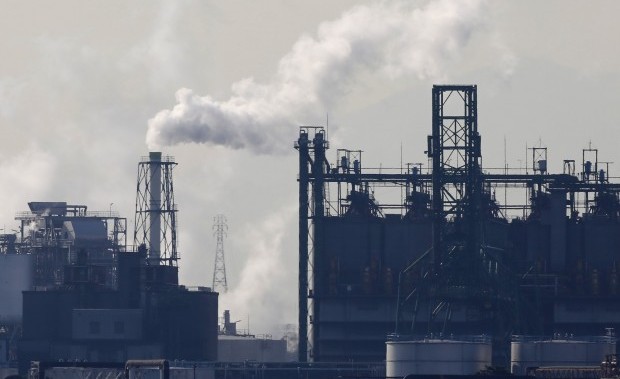
Steam spews from the chimneys of an oil refinery in Kawasaki, south of Tokyo January 30, 2013. (REUTERS/Toru Hanai)
London, Asharq Al-Awsat—To comply with pressure coming from the US and the EU, trading partners in Asia are planning to reduce oil imports from Iran.
India, Japan, and South Korea are distancing themselves from Iranian oil exports. Together they form a considerable share of Iran’s oil market, but are now looking to source their crude oil elsewhere.
This move is likely to add more uncertainty to an Iranian oil market already under strain due to the on-going sanctions targeting oil exports from Iran, among other areas.
Iran holds the world’s fourth largest proven oil reserves and the second largest natural gas reserves. The US Energy Information Administration (EIA) estimated that in 2010, half of Iran’s government revenues came from the production and export of approximately 4 million barrels per day (bpd).
But Tehran’s economy is now suffering in the face of strong economic sanctions. At the beginning of the year, Rostam Qasemi, the Iranian Minister of Petroleum, acknowledged that there had been a 40 percent decline in oil sales in a statement to parliament. Oil exports fell to around 1 million bpd, compared with 2.2 million one year earlier.
This economic trend will continue to worsen should the Asian market cease to trade with the Islamic Republic.
Japan and South Korea are two of the largest importers of Iranian oil, behind China and India. Together they make up nearly a quarter of all Iranian oil exports. However, according to the Financial Times, Japan and South Korea are now planning to cut their imports by between 5 and 15 percent every six months.
Imports of oil from Iran had been increasing until the ban, with Japanese imports peaking at 339,000 bpd in January 2012, and South Korean imports at 251,000 bpd, according to the Rhodium Group, a US based economic advisory firm.
Since then, Iran’s exports to the Asian market have been in decline, with Japan receiving no crude oil from the Islamic Republic in July 2012. Likewise, South Korea did not import any oil from Iran for the following months of August and September.
According to Dr. Ramon Pacheco Pardo, an Associate at the London-based King’s College China Institute, the US and EU have put pressure on Tokyo and Seoul to source their crude oil elsewhere.
“They have been pointing out the other sources of oil and gas that they could explore,” Dr. Pardo told Asharq Al-Awsat. “The latest sources of oil imports are mainly Saudi Arabia, Kuwait and the UAE. Around two-thirds of [Japanese and South Korean] oil imports are coming from the Gulf states.”
“Also, Japan and South Korea will start to get more oil from Russia via the new pipeline going through China to its east coast, which is still a cheap source of oil for them since they’re so close”, he added.
The pipeline, due for completion next year, along with increased exports from Gulf states, will provide the capability to remove Iran from the Asian oil market.
Similarly, India, the second largest importer of Iranian oil behind China, may begin to look to other OPEC countries to replace Iranian imports. This comes as the result of an inability to insure refineries, also due to the strict economic sanctions put in place by the US and the EU.
Iran has also been rapidly overtaken in the list of countries supplying oil to India, falling four places this fiscal year. In an attempt to meet India’s ever-expanding energy requirements, Saudi Arabia, Iraq, and Kuwait now provide nearly six times as much oil to India than Iran.
